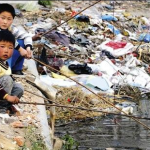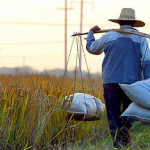From environmental economic, well-defined property right and evaluation about externality will be essential for us to protect the open access resource. Today, I will show you the current land pollution problem in China.
As a Chinese, land is a important element in traditional culture. Just like “Gone with the Wind” line–the land they live on is like their mother. Unfortunately, this kind of love is becoming more and more unfamiliar to younger generation. In 2006, report from ministry of environment protection shows china already become one of the countries which suffer the most serious land pollution. In the China, 150 million acres chinese farming land was polluted. Besides that, 32.5 million and 2 million acres land was polluted due to water pollution and waste dumping, respectively. The total polluted area is 10% of all the farming land.
The land pollution issue of China not only land itself. The related problem is healthy issues and food security. Argument from Nandu.com emphasis about there is no laws about how to protect the land from pollution. Making a new law like “water pollution law” etc.is the key to solve this problem. However, my question is ” Is this the key to solve this problem?”
Chinese Land Pollution was caused by the combination of overwhelming urbanization or industrialization, lack of property right to the open access resource, the low opportunity cost of land pollution and the poor enforcement teams. I understand law is important when solving the Land pollution problem. However, it is not the key. It is a prerequisite before enforce it. The key is how to make plants, companies, institutions willing to reduce the pollution rather than dumping the waste directly to the river and land.
- From my perspective, it is a critical step to assign the “property right” to the farmer, so they can sue anyone including the state-enterprise for compensation. Of course, the law have to state clearly compensation detail to prevent governmental officer find loops for their own benefit.
- It is important to recognize about the externalities of pollution and transfer the wealth to Chinese poor famers who adopt cleaning-pollution technology. Unlike Canadian, the subsidy for Chinese farmer have very limited impact. Traditionally, just like the “Soviet Union”, Farmers always sacrifice for modern development. This is a better method than government supervision, as individual farmer are doing their own favour by decreasing pollution in their land.
- Back to the root problem, incentive is very important. However, the more important one is the independent of jurisdiction. Without it, it is very hard to enforce it. This idea is a little idealized for current China. The more realistic scenario is, central government pay close attention to land pollution. Then, several cases of huge compensation to the farmers were advocate in public media. Last, the land pollution will decreasing in a certain period of time.
To sum up, I think there are many ways to solve land pollution problem in China. Trading the emission quota is a very good option! But I am afraid it is too early to introduce this new idea to Chinese Public. From the environmental economic, the most important thing I remember is Market is not perfect, some of the externalities are not include in the calculation of Value. As a Chinese, I think it is about time to rethinking about the true value of our land.


